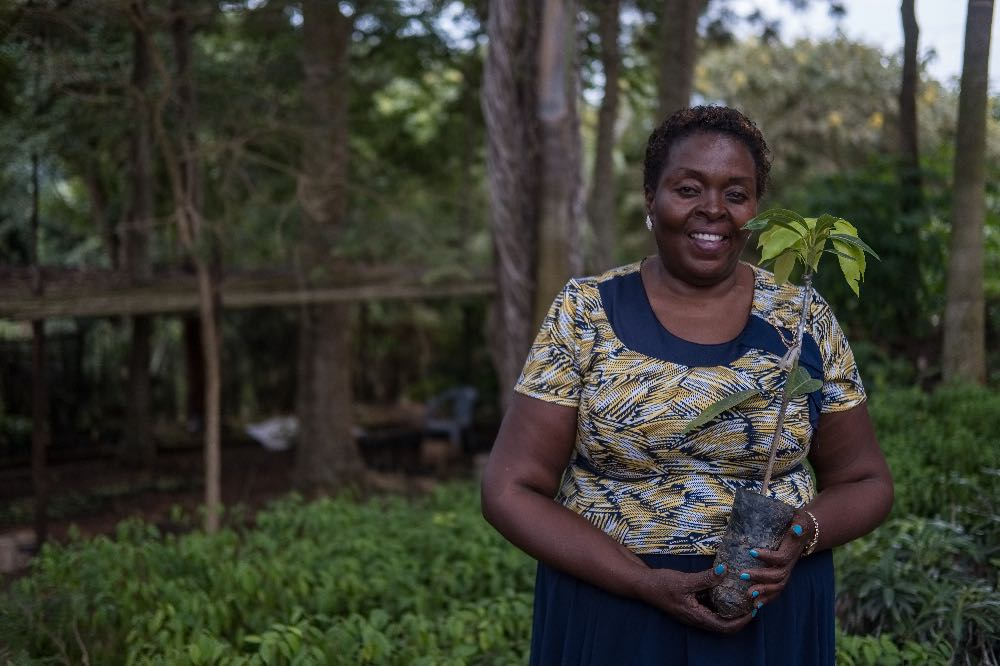This spring, the diocesan Primate’s World Relief and Development Fund (PWRDF) Working Group hopes to help people across the diocese plant 500 trees. And as part of the Branches of Hope Project, they also hope to help plant 500 more with a partner organization in Uganda.
The idea for this project began at Synod in 2022 when Bishop Shane Parker introduced those gathered to a global initiative from the Anglican Communion in response to the climate change crisis. The Communion Forest is intended as “a practical, spiritual, and symbolic response to the environmental crisis, and an act of Christian hope for the well-being of humanity and all God’s creation.” It encourages Anglicans across the world to plant trees and engage in forestation in ways that are appropriate to their own local context.
Archdeacon Patrick Stephens, chair of the diocesan PWRDF Working Group, told Crosstalk that it also happened that Josephine Kizza, executive director of longtime PWRDF partner St. Jude Family Projects was in Ottawa, met with the working group and attended a part of Synod. Part of the St. Jude work involves “planting trees, native species, sometimes fruit bearing trees, but sometimes trees that are for various reasons beneficial to the soil and the natural environment,” Stephens told Crosstalk. “We were really impressed and also affected by her story and the work that she does and the people she works with. And so we wanted to support that initiative and we decided that we also wanted to participate in the Communion Forest Initiative.”
Stephens suggested combining the local and international efforts, and the working group envisioned planting trees both here in the diocese and donating funds to St. Jude’s to plant trees in Uganda. They wanted to buy 500 seedlings for people across the diocese to plant as a part of the Branches of Hope project. They were just missing one vital ingredient — the money to buy the trees.
When she heard about their idea, Dean Beth Bretzlaff brought that obstacle to the parish council of Christ Church Cathedral, where the parish is enthusiastic about planting trees but short on space to plant until a project to improve its Queen Street entrance is completed. The council quickly and unanimously agreed to donate the $3,000 required to buy the trees to PWRDF to help other parishes, groups or individuals plant trees this spring.
“Everyone was supportive and thought it was a great idea,” Vicar’s Warden Catherine Morris told Crosstalk, adding that the Cathedral serves everyone in the diocese and the parish likes to strengthen connections to other parishes.
Morris thought of another way for the project to grow once the space at the Cathedral’s Queen Street entrance is ready for planting the microforest project they have in mind. “I thought it wouldn’t be neat, since … we’re everyone’s Cathedral if different churches could donate money and then put a tree in or a plant in, she explained. “When the time comes, we’ll invite other churches within the diocese to plant a tree. Then they can say this is St. Matthew’s tree, or this is the shrubbery of St. Aidan’s.”
The Cathedral’s project will focus on parishes, but Stephens underlined that the broader Branches of Hope project isn’t just for parishes. Any individual or group can plant a tree or trees. “We’re asking people to sign up at their local parish. They can ask their priest or ask me.” [Please email [email protected] or call 613-870-1440] The Working Group would like to have the list of names by Feb. 1, 2023, so that they can order the trees and distribute them in the spring.
Branches of Hope now has its own landing page on the PWRDF website. Now that the Cathedral has paid for the trees to be planted here in the diocese, donations can all go to planting trees in Uganda. The goal is to raise $5,000, so at least 500 trees can be planted there. You can also read more about Josephine Kizza’s work in Uganda.
Stephens said that the diocesan group will be in touch with the office overseeing the international Communion Forest initiative. “There’s a global map, so, we’ll have Ottawa on the map.”


Saint Mary’s Church, Westmeath — Deanery of the Northwest